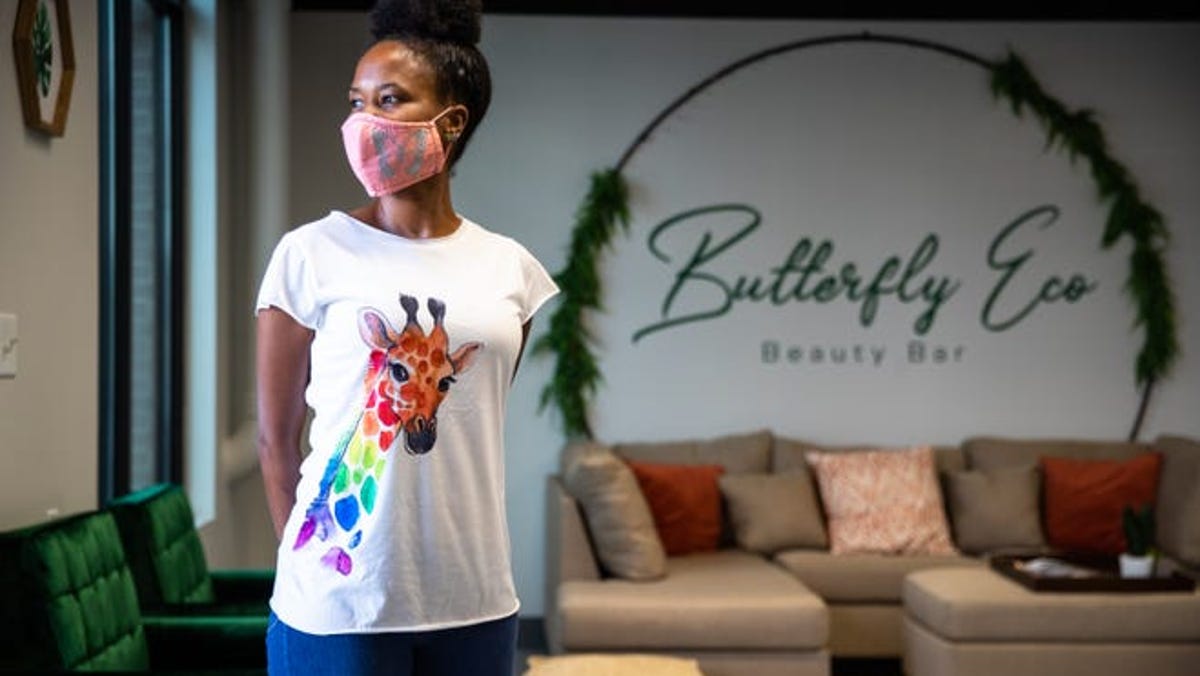Black woman face uphill fight in business
4 min read
| Erie Times-News
GREENVILLE, S.C. – As a Clemson University student in the ’90s, Nekita Sullivan and her friends had to pile in a car and drive to Greenville, Seneca or Anderson for Black beauty products and hair care.
The inconvenience of traveling two or three towns over for beauty care gave Sullivan an idea: a multiethnic beauty bar where students and university employees of all races and hair textures could go in the heart of downtown Clemson.
Sullivan finally realized that dream after more than 20 years, but she didn’t know how difficult it would be.
Women, especially women of color, face more obstacles than their white, male counterparts when opening a small business, according to Ana Parra, director of the newly opened Women’s Business Center in Greenville, S.C.
For Sullivan, it took nearly three years after signing a lease in downtown Clemson, to customize her salon and open it. It took months to find a salon manager, hairstylists, nail technicians and estheticians who were capable of working with all types of hair.
Funding was a major obstacle.
“I was turned down by several banks, I was not able to get a traditional SBA (Small Business Association) loan,” she said. She said the lenders wouldn’t “take a chance” on her since they didn’t think her business could be as profitable as her physical therapy job, which earns her up to $120,000 a year.
Without a loan, Sullivan used credit cards to get cash. She dipped into her savings, her retirement fund and her monthly income. She is leasing her house for rental income. She moved back in with her parents to keep costs low.
She estimated she’s more than $150,000 in debt. She’s sunk another $100,000 of her personal income into the salon.
While there is a “small community” of Black-owned businesses in Clemson – where orange and purple are the colors of choice – racial prejudices and stereotypes often associated with the South are still around, said Bryant Smith, a Black business owner and leadership consultant.
“We can’t pretend that people don’t make decisions based on race and culture and those kinds of factors, because people do,” Smith said.
Even with the obstacles and fears – and after 24 years as just a dream – Sullivan opened Butterfly Eco Beauty Bar in downtown Clemson on Valentine’s Day.
Then, a pandemic happened – recession-level layoffs, Clemson University sent students home, the governor ordered salons, including Butterfly Eco, to shut down.
As of Sept. 10, Sullivan had yet to fully reopen.
Through it all, COVID-19 has illuminated the barriers small business owners face in opening and staying afloat, according to Ben Smith of the Clemson Small Business Development Center. And in Clemson, COVID-19 has shown just how reliant entrepreneurs like Sullivan are on the student population for financial success.
Sullivan’s struggle to find traditional funding was not a rarity, Parra said.
White applicants are more likely to be approved for business financing at banks than their Black counterparts, 80% compared to 62%, according to the Federal Reserve Bank study.
Parra said this is mainly due to white businesses traditionally being more successful, and from the systemic practice of banks not funding Black customers, a Jim Crow-era practice that had lasting consequences.
“Historically, when it comes to communities of color, they have been under-served by traditional banking institutions… we’re addressing many years of people not paying attention to equity and not addressing these biases,” Parra said.
And being a woman of color means your chances of success are even more limited, according to a 2019 report from American Express. Black-women-owned businesses earn less than 17% of the average yearly revenue for all women-owned businesses, the report found.
The Women’s Business Center, a Small Business Administration program housed in Greenville-nonprofit Community Works, aims to address these equity gaps in the Upstate region, Parra said. The center mentors women, including Sullivan, who own small businesses, particularly in how to finance and advertise themselves.
Sullivan said she spent all her money “rushing to open” the store in February, “that money had to come from somewhere, so we had to step back from marketing and advertising to just open.”
But Parra said marketing oneself as a woman- or person of color-owned business is one of the strongest assets women like Sullivan have when seeking new customers.
Sullivan admitted her decision to remain “behind the scenes” and not market herself as the owner was a mistake she made out of fear.
“Business owners like Nekita might not realize that they can bring their authenticity of self to their business and might be shrinking themselves… they don’t realize the greatest asset is who she is or what she’s bringing to the table. And I think that we would never, ever advise anyone to hide who they are,” Parra said.
When she was opening the salon, Sullivan did take steps to conceal her identity, fearful of how the downtown Clemson business community would perceive her as a Black woman.
“I was very meticulous about that. When I came here, I was always very cautious about not being seen outside of the front of my building, coming through the back door and not actually identifying myself as the owner…. I did not want that to be a reason why people did not support me,” Sullivan said.





